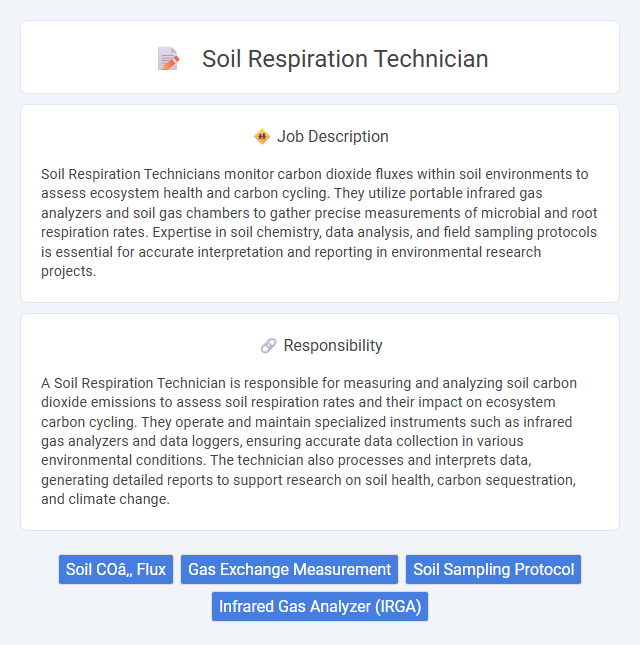
Soil Respiration Technicians monitor carbon dioxide fluxes within soil environments to assess ecosystem health and carbon cycling. They utilize portable infrared gas analyzers and soil gas chambers to gather precise measurements of microbial and root respiration rates. Expertise in soil chemistry, data analysis, and field sampling protocols is essential for accurate interpretation and reporting in environmental research projects.
Individuals with a strong interest in environmental science and fieldwork likely have a high probability of thriving as Soil Respiration Technicians, as the job requires regular outdoor activity and precise data collection. Those comfortable with physical tasks and working in varied weather conditions may find it particularly suitable, while individuals who prefer office-based or low-activity roles might encounter challenges. Experience with scientific equipment and attention to detail are probable indicators of success in this role.
Qualification
A Soil Respiration Technician must possess a strong background in environmental science, biology, or a related field, often requiring a bachelor's degree for entry-level positions. Proficiency in operating soil respiration measurement instruments, such as infrared gas analyzers, and experience with data collection and analysis software are essential. Practical skills include sampling techniques, understanding soil ecology, and the ability to accurately record and interpret soil CO2 flux data for ecological research.
Responsibility
A Soil Respiration Technician is responsible for measuring and analyzing soil carbon dioxide emissions to assess soil respiration rates and their impact on ecosystem carbon cycling. They operate and maintain specialized instruments such as infrared gas analyzers and data loggers, ensuring accurate data collection in various environmental conditions. The technician also processes and interprets data, generating detailed reports to support research on soil health, carbon sequestration, and climate change.
Benefit
Soil Respiration Technician roles likely offer competitive salaries reflecting the specialized skills required for measuring and analyzing soil gas fluxes. Benefits may include opportunities for hands-on experience with advanced environmental monitoring equipment, enhancing career growth in ecological research and environmental science. Health insurance, paid leave, and potential fieldwork travel allowances might also be part of the compensation package.
Challenge
Soil Respiration Technicians often face the challenge of accurately measuring gas fluxes in diverse and dynamic field conditions, which requires precise calibration and attention to environmental variables. The complexity of interpreting soil respiration data may demand advanced knowledge of soil science and ecological processes. Success in this role probably depends on adaptability and meticulous data collection under varying weather and soil moisture conditions.
Career Advancement
Soil Respiration Technicians monitor carbon dioxide fluxes in soil to assess ecosystem health and carbon cycling, utilizing advanced gas chromatography and infrared gas analyzers. Mastery in data analysis software and experience with field instrumentation can lead to roles such as Environmental Scientist or Ecologist, enabling career growth in environmental research. Specialization in soil biogeochemistry and project management skills further enhance opportunities for advancement into senior research or consultancy positions.
Key Terms
Soil CO₂ Flux
Soil Respiration Technicians specialize in measuring soil CO2 flux to assess microbial and root respiration rates critical for understanding carbon cycling and soil health. They operate advanced gas analyzers and chamber systems to collect precise data on soil-atmosphere gas exchange under varying environmental conditions. Expertise in data analysis software enables accurate interpretation of respiration rates, supporting ecological research and climate change models.
Gas Exchange Measurement
A Soil Respiration Technician specializes in measuring gas exchange between soil and the atmosphere, crucial for assessing soil carbon flux and ecosystem respiration rates. Utilizing advanced instruments such as infrared gas analyzers and closed-chamber systems, they collect precise data on CO2 and trace gas emissions. Expertise in calibration, data logging, and field sampling protocols ensures accurate monitoring of soil respiration dynamics under varying environmental conditions.
Soil Sampling Protocol
A Soil Respiration Technician follows precise soil sampling protocols to collect representative samples for measuring soil carbon dioxide flux. This process involves selecting sampling sites based on vegetation and soil characteristics, using sterile tools to avoid contamination, and maintaining proper sample storage conditions to preserve microbial activity. Accurate soil respiration measurements rely on consistent sample handling and adherence to standardized methods to ensure data reliability for ecological and environmental assessments.
Infrared Gas Analyzer (IRGA)
Soil Respiration Technicians specialize in measuring soil CO2 efflux using Infrared Gas Analyzers (IRGA) to assess microbial and root respiration rates critical for ecosystem carbon cycling studies. Proficiency in calibrating and operating IRGA devices ensures accurate collection of soil respiration data for environmental monitoring and climate change research. Technicians analyze real-time gas exchange measurements to support soil health assessments and contribute to biogeochemical modeling efforts.
 kuljobs.com
kuljobs.com